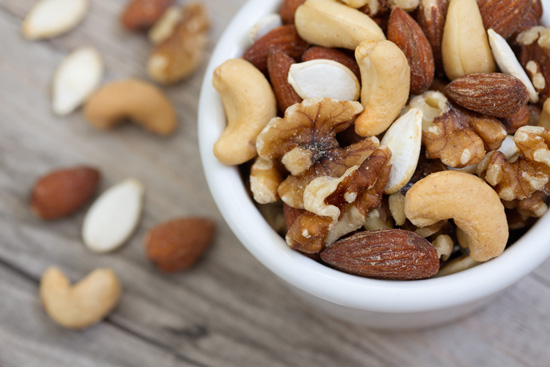About The Buzz: Eating Nuts Reduces Disease Risk?

WHAT THEY’RE SAYING
Until recently, the connection between consuming nuts and disease risk was not clearly understood. Research studies, which include populations from America, Europe, Southeast Asia and the Western Pacific, show that the daily consumption of nuts can dramatically lessen the risk of cardiovascular disease, cancer and various other diseases.
WHAT THIS MEANS
Nuts are good sources of important nutrients that keep a body healthy and well – dietary fiber, magnesium, polyunsaturated fats, vitamin E, antioxidants and bioactive compounds. All of these elements play a role in reducing the risk of cardiovascular disease and cancer. Studies have shown that a high intake of nuts is associated with a reduced risk of coronary heart disease, and possibly diabetes, overweightness and obesity, gallstones and colorectal cancer. However, until now, the relationship between a high dietary intake of nuts and risk of specific diseases was not very well understood. Researchers sought to determine how many servings of nuts per day is needed to reap health benefits and did so by analyzing the results of all studies to date on the topic.
THE RESEARCH
Their comprehensive review included 29 highly specific studies on the topic of nut consumption and disease risk. The total sum of all study participants included up to 819,000 participants, mostly adults, and assessed nut intake and risk of coronary heart disease, stroke, cardiovascular disease, cancer, all-cause mortality, and mortality from respiratory disease and diabetes.
RESULTS OF THE RESEARCH
The findings show that eating 20 g of nuts a day (equivalent to a small handful) can diminish the risk of coronary heart disease by nearly 24%, the risk of cancer by 18%, and the risk of stroke by about 10%. Additionally, nut consumption of 20g a day reduced risk of premature death by 19% and the risk of dying from respiratory disease and diabetes by 52% and 39%, respectively.
WHY THIS MATTERS
In 2013, cardiovascular disease and cancer were the top two leading causes of death, accounting for nearly 25.5 million deaths worldwide. This study demonstrates the impact that nuts can play in reducing the burden of these diseases worldwide. Additionally, this study explored the lesser-known connection between nuts and other diseases, such as stroke, diabetes and respiratory disease and found that nuts can help to reduce risk for these diseases as well.
Regularly eating nuts can help you reduce your risk of disease, which is pretty impressive for eating such a small amount of food. Incorporating nuts into your everyday dietary routine, along with ample fruits, vegetables, whole-grains, healthy fats, legumes and animal protein such as eggs, fish and poultry, is an important component of a balanced, healthy diet.
OUR ADVICE
Go Nuts!
Adding nuts into your diet isn’t hard to do – you can enjoy them alone as a snack or as a new nutty element in recipes you already enjoy. Not sure where to start? Check out the recipes below for some inspiration (and our article, Top 10 Ways to Enjoy Nuts). If adding nuts to your grocery list will put you over your budget, purchase your favorite type of nut in bulk (purchasing larger quantities is less expensive). Nuts are high in fat and can go rancid, but you can avoid this by wrapping them well in plastic and placing them in a resealable freezer bag.2
11 Ways to Add Nuts to Your Day
- Nutty Pancakes. Add your favorite roasted nut into the mix for a nutty take on pancakes. Alternatively, opt for a nut butter to flavor your pancakes instead of butter and syrup. Adding nut flour into the pancake mix will also add flavor and protein to pancakes.
- Loaded Oatmeal. Oatmeal doesn’t have to be boring. To spice up this classic breakfast item, sprinkle your oatmeal with nuts, dried fruit and cinnamon.
- Fancy Toast. Top whole-grain toast with peanut butter and bananas.
- Superfood Smoothie. Blend almond butter or peanut butter into your smoothies for creaminess and flavor
- Power Parfait. Sprinkle your yogurt with granola, dried fruit and nuts for a satisfying bowl of yogurt
- Satisfying Snacks. Nuts are nutritionally dense, meaning they’re a perfect snack to keep you satisfied until your next meal. Pack snack baggies of a single serving of nuts (around 200 calories) and keep them in your car, at your desk or in your bag.
- Apple & Nut Butter. There’s nothing like the satisfying crunch of a sweet, juicy apple dipped in peanut butter. This fiber-filled combo is as easy to pack as it is to eat when you’re busy but looking for a healthy snack.
- Crunchy Salad. Nuts are a great way to add a crunch and depth of flavor to salads. Sprinkle roasted pine nuts, pistachios, cashews, walnuts or peanuts into salads.
- Nuts & Veggies. Sauté green beans in olive oil and top with toasted almonds. Try roasted carrots and squash, broccoli and walnuts or a cashew veggie stir-fry.
- Pine Nut Pesto. Pesto makes for a delicious dip, spread or sauce for crackers, sandwiches, veggies and meat dishes. This blend of basil, olive oil, garlic, Parmesan cheese and pine nuts is a tasty, healthy and flavorful favorite.
- Peanut Butter “Ice Cream.” Nuts and nut butters can be a delicious addition to your favorite desserts. For a healthier take on ice cream, blend frozen banana together with peanut butter for an irresistible treat!
Video Center: Selection. Storage. Preparation.
How Many Cups Do You Need?
Key Nutrients in Fruits & Vegetables
Fruit & Veggie Database


